
Battle Over Voter ID Laws Continues as Pennsylvania Democracy Activists Fight Presidential Timing
Democracy, elections and voting at Democracy Chronicles
Older Adults Protest New Voter ID Law at Philadelphia Rally
Hundreds of older Pennsylvanians yesterday protested the implementation of Pennsylvania’s new voter ID law by chanting “Don’t Block My Vote” at a midday rally near Independence Mall in Center City Philadelphia.
The rally followed Wednesday’s filing of an Amicus (friend of the court) brief in Commonwealth Court by nine senior advocacy organizations supporting a lawsuit challenging Pennsylvania’s new Voter ID law that is scheduled for trial July 25 in Harrisburg. The coalition of senior organizations filing the Amicus court brief includes: Senior LAW Center; AARP; Pennsylvania Association of Area Agencies on Aging; Center for Advocacy for the Rights and Interests of the Elderly; Pennsylvania Alliance for Retired Americans; the Pennsylvania Homecare Association; ElderNet of Lower Merion and Narberth; the Institute for Leadership, Education, Advancement and Development, and Intercommunity Action, Inc.
“As a non-partisan organization, AARP opposes the voter ID law as a matter of fairness,” said AARP Pennsylvania State Director Ivonne Gutierrez Bucher. “Thousands of older Pennsylvanians could be shut out of the voting process this November simply because they don’t have the right kind of identification required by Pennsylvania’s new voter ID law.”
Senior advocates believe the new voter ID law particularly disenfranchises older adults—especially those with disabilities or from economically disadvantaged populations. According to a national study, nearly one in five citizens over 65 lacks a current, government issued photo ID. Older adults often give up their driver’s license or may never have had one. Seniors are also more likely to lack raised seal birth certificates necessary to acquire a new photo ID.
“For many older Pennsylvanians, the burden of obtaining the required documentation in terms of dollars, time and difficulty will make exercising their franchise so difficult and costly as to effectively deny them the right to vote,” said Karen Buck, Executive Director of the Philadelphia-based Senior Law Center.
Joining advocates for older adults at yesterday’s rally were Philadelphia City Commissioner Stephanie Singer; Reggie Shuford, Executive Director of the ACLU of Pennsylvania; John Chin, Executive Director of the Philadelphia Chinatown Development Corporation, Ellen Mattleman Kaplan, Vice President and Policy Director for the Committee of Seventy, and David Castro, President of the Institute for Leadership, Education, Advancement and Development.
Recently-released figures from the Pennsylvania Department of State show more than 750,000 individuals statewide could have trouble voting this fall because they don’t have a current PennDOT photo ID, representing nine percent of the state’s registered voters. Voting rights advocates have also raised concerns about the state’s ability to educate older adults about new ID requirements and provide the necessary free IDs in time for November’s General Election.
On May 1, The American Civil Liberties Union of Pennsylvania, the Advancement Project, the Public Interest Law Center of Philadelphia (PILCOP), and the Washington, DC law firm of Arnold & Porter LLP filed a lawsuit on behalf of ten Pennsylvania voters and three prominent advocacy organizations, alleging that the state’s voter photo ID law violates the Pennsylvania Constitution by depriving citizens of their right to vote. A trial has been scheduled for July 25 at the Judicial Center in Harrisburg.
“This law deprives many eligible voters in the commonwealth—disproportionately the poor, minorities, senior citizens, young voters and people with disabilities—of their fundamental right to vote,” said Marian K. Schneider of the Advancement Project, one of the lead attorneys on the Voter ID legal team. “If this law is allowed to stand it will disenfranchise thousands of voters in Pennsylvania who cannot overcome the law’s many hurdles and will undermine the basic fabric of our democracy.
Leave a Reply